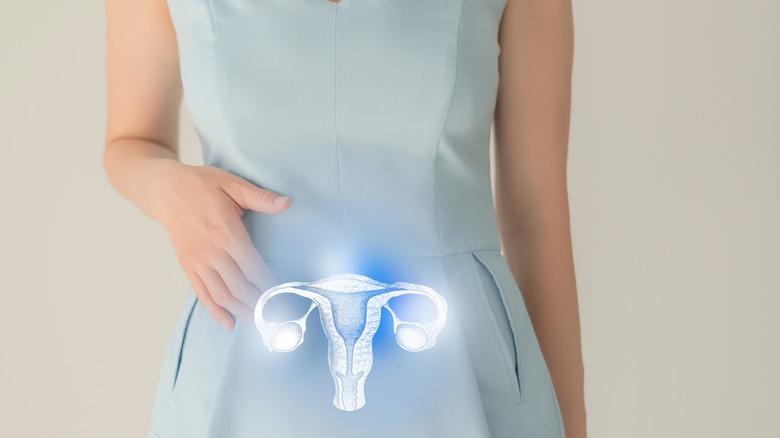What Happens If You Take Plan B While Pregnant?
You probably know Plan B as the "morning-after pill" or as a form of emergency contraception if you have unprotected sex (per Verywell Family). But if you're already pregnant, you may be wondering how Plan B can affect the growing fetus. Understanding the timeline of how a potential pregnancy originates is the first step in figuring out what can happen if you take Plan B while pregnant.
When you have sex, pregnancy isn't instant, says Healthline. In fact, it can take up to five days for pregnancy to occur. In order for pregnancy to occur, the sperm and egg must first meet and the sperm must fertilize the egg within the fallopian tube during the window of time when a woman is fertile, usually within the first 12 to 24 hours after the egg is released from the ovary. Since sperm can hang around within a woman's reproductive organs for up to 120 hours, and a single ejaculate can contain up to 280 million sperm, a woman doesn't necessarily have to be within her fertile window during sex for fertilization to occur. Then, after fertilization occurs, it takes up to 10 days for the fertilized egg to implant into the uterine lining. Here's how Plan B can affect that process.
Plan B prevents pregnancy
Plan B typically contains levonorgestrel, a hormone that is often used in oral birth control methods and can be used as emergency contraception to prevent pregnancy, per WebMD. The key indicator here is that Plan B, which is also sold under the names My Way, Take Action, Econtra EZ, Preventeza, and Next Choice One Dose, is intended to prevent pregnancy and not to eliminate it once it has already occurred. Emergency contraception should be taken as soon as possible, but depending on the brand, can be taken up to three to five days after unprotected sex to prevent pregnancy from occurring (per Office on Women's Health).
If you are already pregnant, Plan B won't cause a miscarriage, according to Planned Parenthood. Taking emergency contraception won't harm a fetus. Plan B only works to prevent pregnancy, which can be achieved in one of three ways (via Verywell Family). Levonorgestrel, a progestin hormone, can intercept a potential pregnancy by barring an egg from being released from the ovaries, protecting an egg from being fertilized by a sperm, and stopping the implantation of an egg that has been fertilized. But levonorgestrel won't do anything to a fertilized egg that has successfully implanted into the uterine lining.
When to take Plan B
To prevent pregnancy, Plan B or any other form of emergency contraception should be taken as soon as possible (per Verywell Family). Some forms of emergency contraception consist of one pill that should be taken within 72 hours of having unprotected sex, while other options consist of two pills, one which should be taken within the initial 72 hours and the second 12 hours after the first dose.
Per Verywell Family, Plan B is usually advised to be taken if you've had sex without any form of birth control or protection, you forgot two or more active pills of your regular birth control or forgot to apply your patch or ring, a condom became broken or slipped off of your male partner, a diaphragm slipped out of position, or you were forced into intercourse without your consent. Plan B won't terminate a pregnancy, cause a miscarriage, or protect you from sexually transmitted diseases (STDs).
After taking Plan B or another type of emergency contraception involving levonorgestrel, you may experience side effects including headache, dizziness, fatigue, vomiting, abdominal pain, and changes in your menstruation (per WebMD). You should not take products containing levonorgestrel, including Plan B, if you're aware that you're pregnant. You should also avoid Plan B if you have an allergy or sensitivity to any of its ingredients. If you know that you're already pregnant, or if you have any questions about taking Plan B, always consult with your healthcare provider.



